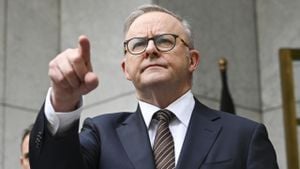Indonesian President Prabowo Subianto has made headlines with his recent diplomatic engagements during his visit to the United States. Arriving on November 10, less than a week after Donald Trump’s electoral win, Prabowo’s trip is seen as both strategic and timely. With the eye on establishing strong ties with the new, incoming administration, he scheduled meetings with significant political leaders, aimed at solidifying U.S.-Indonesia relations after years of fluctuations.
On November 12, Prabowo met with U.S. President Joe Biden at the White House, reiteratively emphasizing his commitment to enhancing cooperation. “I will work very hard to strengthen Indonesian-United States relationship, and I would like to work toward this end to have strong cooperation,” he stated during their meeting, which covered pivotal topics including climate change, regional stability, and trade opportunities.
Before engaging with Biden, he conveyed his congratulatory sentiments to President-elect Trump over the phone, expressing his willingness to meet him personally. This call, shared on social media, showed Prabowo’s intention of fostering good personal connections, which some analysts believe is key to diplomatic success, as individual relations often translate to bilateral negotiations.
Prabowo’s visit is not purely ceremonial; it reflects Indonesia's ambition under his leadership to maintain its non-aligned foreign policy stance. Visiting straight from China, where he met President Xi Jinping, Prabowo aims to balance Indonesia's relationships between two opposing global powers—Beijing and Washington. This balancing act is pivotal for Jakarta, which stands as the most populous country in Southeast Asia, and increasingly viewed as strategic within the region, particularly as Western nations seek to curtail China's influence.
The backdrop of this visit is also based on mutual economic interests. Indonesia is not only becoming one of the U.S.’s significant arms buyers but also harbors ambitions of exporting more of its abundant resources, including metals and minerals, to the West. The discussions surrounding these economic facets will ideally set the groundwork for renewed investments from U.S. companies.
Prabowo’s administration faces the challenge of heightening U.S. business confidence, which has wavered due to previous complications with policymaking and transparency issues under previous governments. During meetings with representatives from major firms like Freeport McMoRan and Chevron, he reassured them of Indonesia’s commitment to creating an environment conducive for investments. "America is very involved with the Indonesian economy, and firms must remain engaged with our development plans," he emphasized, indicating proactive efforts to address past investor concerns.
Reflecting on past administrations, experts believe the new dynamics introduced by Trump's return could greatly influence bilateral relations. Analysts suggested Prabowo's increasing outreach to Trump's circle could yield dividends, especially when considering Trump’s established personal relationships with leaders he respects. This sentiment reinforces the idea posited by many experts: solid personal relationships often support stronger bilateral ties.
Yet, to realize these ambitions fully, experts assert the necessity of appointing ambassadors and officials who can maintain open communication and rapport with U.S. counterparts. Notably, the top U.S. ambassador position to Indonesia has remained vacant for over a year. According to policy experts, this absence risks impeding the rekindling of bilateral discussions and could be perceived as Jakarta lacking seriousness about enhancing its U.S. connections.
Important as these engagements are, the visit also sheds light on Indonesia’s firm stance concerning its sovereignty, particularly related to maritime disputes with Beijing. On November 11, Indonesia reaffirmed its position of not recognizing China’s expansive claims over most of the South China Sea, showcasing its intent to navigate its own diplomatic waters amid regional pressures.
The outcome of Prabowo’s visit to Washington will likely shape Indonesia's foreign policy approach moving forward as it endeavors to affirm its influence, build amicable partnerships, and attract investment through determined engagement. This complex matrix of diplomatic activity reflects the nuanced, interdependent relationship between Indonesia and the United States, set against the backdrop of China’s rising power.
While the results of these high-profile meetings will take time to fully materialize, analysts and observers are on alert to see how the strategic interplay of international relations continues to evolve under President Prabowo's lead.



